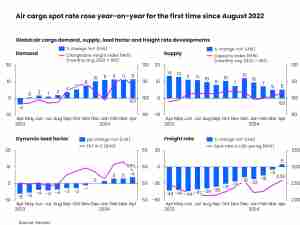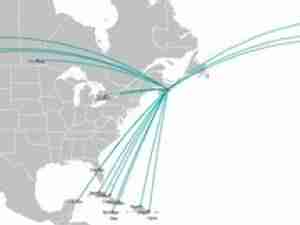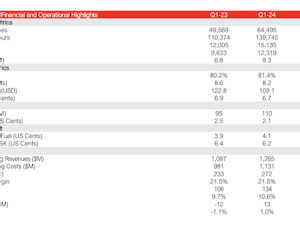Cathay Pacific Airways Ltd. expects a “substantial loss” in the first half of 2020 as the coronavirus crimps travel demand, adding to the challenges facing a carrier that’s already been humbled by the political unrest in Hong Kong.
The forecast came as Cathay said its net income tumbled 28% to HK$1.69 billion ($218 million) in 2019, slightly better than the average estimate of six analysts tracked by Bloomberg. Profit in the traditionally stronger second half of the year was only HK$344 million as social unrest and U.S.-China trade tension intensified, Hong Kong’s flagship airline said in a statement Wednesday.
“We were faced with an incredibly challenging environment to operate as the Hong Kong economy slipped into recession,” Chairman Patrick Healy said in the statement. The coronavirus outbreak has exacerbated Cathay’s troubles and put it on course for its first loss in two years. “Travel demand has dropped substantially,” Healy said.
The airline has slashed capacity to mainland China by 90% and reduced its entire international network by about 40% because of the coronavirus, which has infected nearly 120,000 people and killed more than 4,200 worldwide. Cathay, which is particularly exposed to the virus because close to half of its revenue comes from Hong Kong and mainland China, has also asked employees to take unpaid leave as it tries to weather the latest crisis.
Cathay said it is likely to continue cutting passenger capacity in May following reductions of about 30% in February and 65% for March and April in terms of available seat kilometers. It will also reduce flight frequencies. “It is difficult to predict when these conditions will improve,” the company said.
When the virus abates and demand recovers, Cathay could even stand to benefit as competitors collapse or have difficulty returning their services, according to Bloomberg Intelligence analysts James Teo and Chris Muckensturm. Cathay’s “dominance in Hong Kong was already strengthened by its acquisition of HK Express last year, which should serve it well as the city remains a key Asian financial and trade hub,” they wrote in a note.
Airlines globally have been hit hard by the coronavirus outbreak, with the International Air Transport Association saying it could cost the industry as much as $113 billion in lost revenue this year. British airline Flybe collapsed last week as the epidemic ended prospects for a U.K. state-backed rescue, while carriers from United Airlines Holdings Inc. and Singapore Airlines Ltd. to Deutsche Lufthansa AG and Qantas Airways Ltd. are slashing flights.
“The situation in 2020 will be much more severe than in 2019” said Luya You, a transport analyst at Bocom International.
Cathay warned about its results before the virus struck as Hong Kong protests led to lower bookings and passengers in the latter part of last year. In addition to the broad drop in tourist numbers, Chinese state-run companies told employees to avoid flying with the airline on business or personal trips after Cathay came under fire from Beijing because some of its workers took part in a general strike and demonstrations.
“Inbound traffic was hit hard, particularly on short-haul and Mainland China routes, while outbound traffic also decreased,” Healy said in Wednesday’s statement. “Demand for premium travel was weak and we became increasingly reliant on lower-yielding transit traffic.”
“We expect our passenger business to be under severe pressure this year and that our cargo business will continue to face headwinds,” Healy said.
Cathay said it will continue to bring in new aircraft this year and is maintaining its plan to take delivery of 70 new planes by 2024. Its new subsidiary HK Express reported a post-acquisition loss for 2019 against expectations for a small profit, while Air China Cargo suffered “a significant decline in results as trade tensions escalated.”
“They had a great first half last year and then all of a sudden with the protests the second half was really dismal,” Sobie Aviation analyst and consultant Brendan Sobie said in a Bloomberg Television interview Wednesday. “It’s just gone from bad to worse for Cathay Pacific and they’re in a very challenging position.”
“It’s going to be pretty bad for most of this year probably and will take a while for the Hong Kong market and global market to recover,” Sobie said.










